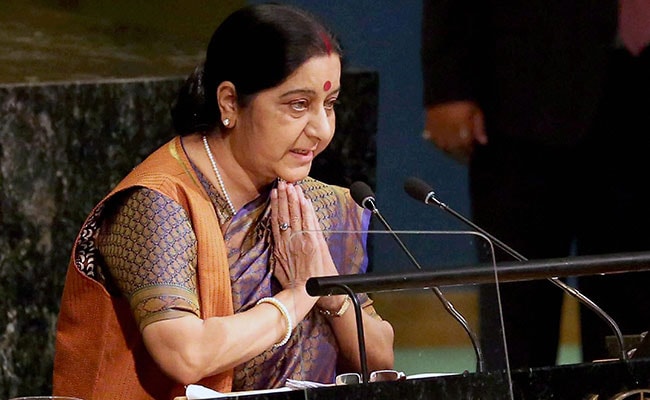
Sushma Swaraj, whose death on Tuesday left the nation in grief, was one of the most respected leaders of the ruling BJP and will perhaps be best remembered for her tenure as External Affairs Minister till earlier this year. She died at Delhi's AIIMS hospital after suffering a cardiac arrest. She was 67.
She had a kidney transplant in 2016 and had opted out of contesting Lok Sabha polls earlier this year for health reasons. While she was seen at Prime Minister Narendra Modi's swearing-in for his second term in May this year, speculation about whether she would be minister again ended when she sat in the audience.
"A glorious chapter in Indian politics comes to an end. India grieves the demise of a remarkable leader who devoted her life to public service and bettering lives of the poor. Sushma Swaraj Ji was one of her kind, who was a source of inspiration for crores of people," PM Modi tweeted.
During her term as foreign minister in PM Modi's cabinet in his first term, Sushma Swaraj gained massive admiration for her responsiveness and compassion. From Indians stranded in conflict zones to foreigners requesting urgent visas for medical treatment, she became a beacon of hope on social media. Her sparkling oratory - in parliament and on the international stage - won her admiration across political lines.

Sushma Swaraj was widely admired for her compassion and quick response to people in distress.
Ms Swaraj had emerged as the most prominent face among her generation leaders of the BJP following the tragic death of Pramod Mahajan in 2006. She grew in stature after the BJP, contesting the 2009 Lok Sabha polls under the stewardship of LK Advani, failed to dislodge the Congress-led UPA government from the centre. Mr Advani, then 86 years old, had to make way for Ms Swaraj as Leader of the Opposition in the Lok Sabha. Being declared as the BJP's prime ministerial candidate for the 2014 general election seemed the next logical step.
But the third consecutive victory posted by Narendra Modi, who's only a year older than Ms Swaraj, in Gujarat in December, 2012 forced a change in the script. The Rashtriya Swayamsevak Sangh (RSS), the BJP's ideological mentor, concluded that only the Gujarat chief minister could charge up the cadre, and spearhead their campaign across the country.
In June, 2012, BJP president Rajnath Singh, with the active backing of the RSS, declared Mr Modi as the party's campaign committee chief, a post which was seen as a prelude to the Gujarat chief minister being declared as the presumptive prime minister. Ms Swaraj, along with BJP veterans such as LK Advani and Murli Manohar Joshi resisted the move, but found themselves somewhat isolated.
However, with her tenure as Foreign Minister, Sushma Swaraj's popularity went beyond her party's support base. On Tuesday, after her death, Rahul Gandhi tweeted: "I'm shocked to hear about the demise of Sushma Swaraj Ji, an extraordinary political leader, a gifted orator and an exceptional Parliamentarian, with friendships across party lines. My condolences to her family in this hour of grief. May her soul rest in peace."
Several path-breaking measures such as the expansion of the passport infrastructure and enhanced engagement with the East were the highlights of her tenure as the External Affairs Minister. She was only the second woman to hold the portfolio after Indira Gandhi, who briefly kept the ministry under her while being the prime minister.

Sushma Swaraj was respected by leaders across party lines
Born in Haryana in 1953, Sushma Swaraj studied law and went on to practice as an advocate in the Supreme Court of India. She began her political career with the student wing of the RSS and joined the BJP after the 1975-77 Emergency.
Sushma Swaraj had many firsts to her credit such as being the youngest cabinet minister in the Haryana government, first woman chief minister of Delhi and the first woman spokesperson for a national political party in the country.
Ms Swaraj has a wealth of ministerial experience. Way back in 1977, she became the youngest cabinet minister of a state. She has been the chief minister of Delhi, and held the portfolios of information and broadcasting, and health in the Atal Bihari Vajpayee government. She became a Member of Parliament in 1990.
Her last tweet on Tuesday was about the government's move on Jammu and Kashmir - scrapping its special status and dividing it into two union territories. "Thank you Prime Minister. Thank you very much. I was waiting to see this day in my lifetime," she said.
Sushma Swaraj is survived by her husband Swaraj Kaushal, a former Mizoram Governor, and daughter Bansuri Swaraj.
Track Latest News Live on NDTV.com and get news updates from India and around the world

